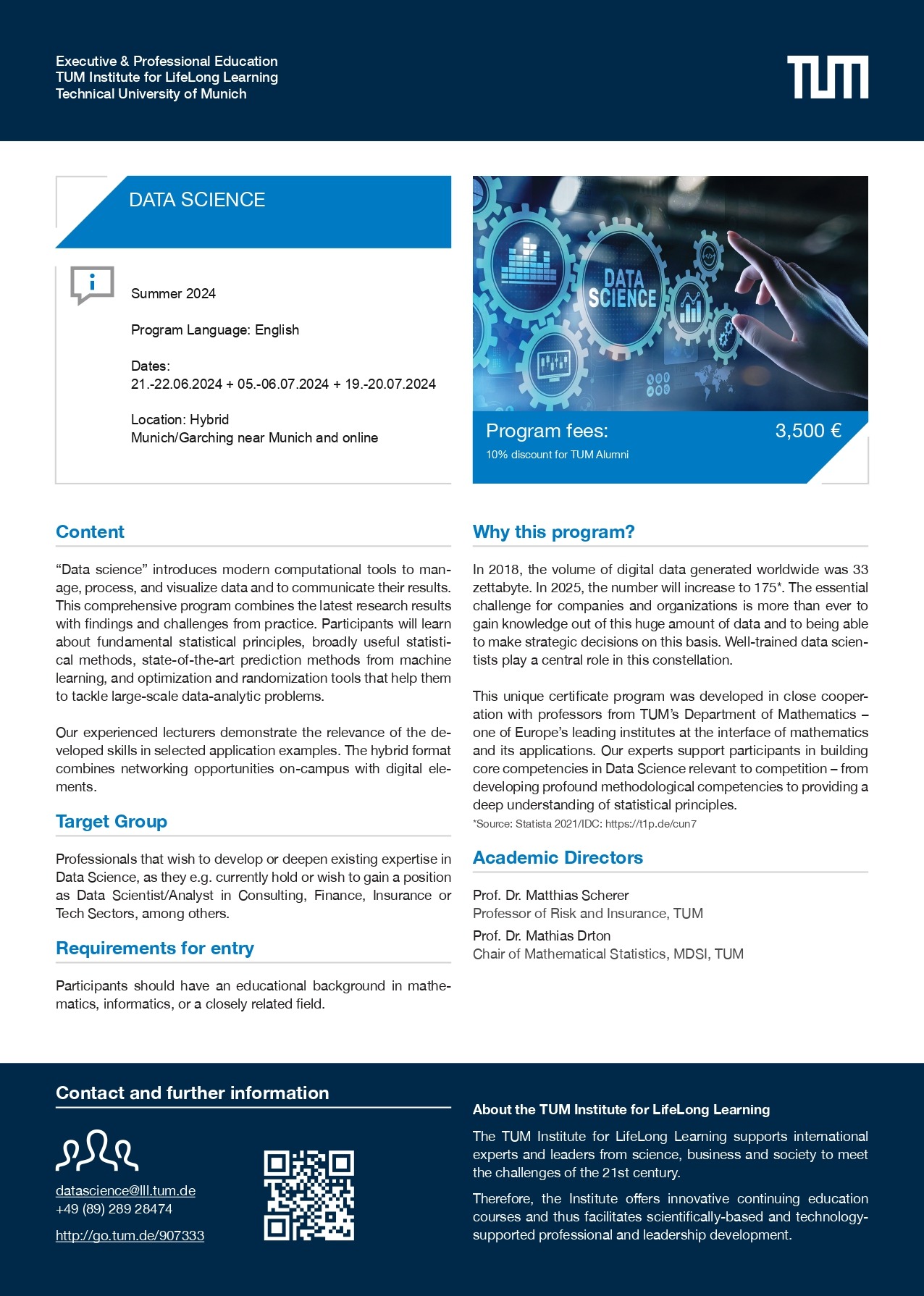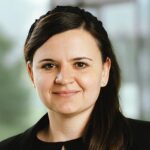“Data Science” introduces modern computational methods to process and visualize data and to communicate results of data analyses. This comprehensive program combines the latest research results with findings and challenges from practice. Participants will learn about fundamental statistical principles, broadly useful statistical methods, state-of-the-art prediction methods from machine learning, and optimization and randomization tools that help them to tackle large-scale data-analytic problems.
Our experienced lecturers demonstrate the relevance of the developed skills in selected application examples. The hybrid format combines networking opportunities on-campus with digital elements.
Why this program?
In 2018, the volume of digital data generated worldwide was 33 zettabyte. This number is expected to increase to 175* by 2025. More than ever, the essential challenge for companies and organizations is to gain knowledge out of this huge amount of data and to be able to make strategic decisions on its basis. Well-trained data scientists play a central role in this process.
Our unique certificate program was developed in close cooperation with professors from TUM’s Department of Mathematics – one of Europe’s leading institutes at the interface of mathematics and its applications – as well as with core members of the MDSI. Our experts support participants in building core business relevant competencies in Data Science – from developing profound methodological competencies to providing a deep understanding of statistical principles.
*Source: Statista 2021/IDC: https://t1p.de/cun7
Details
- Certificate: After successful completion of the final exam, participants will receive a certificate from the Technical University of Munich.
- Duration (in weeks): 4
- Language: English
-
Academic Responsibility:
Prof. Dr. Matthias Scherer, Chair of Risk and Insurance, TUM
Prof. Dr. Mathias Drton, Chair of Mathematical Statistics, TUM -
Module(s) and Dates:
Summer 2024
21.-22.06.2024 + 05.-06.07.2024 + 19.-20.07.2024 - Format: Hybrid
- Target group: Professionals that wish to develop or deepen existing expertise in Data Science, as they e.g. currently hold or wish to gain a position as Data Scientist/Analyst in Consulting, Finance, Insurance or Tech Sectors, among others.
- Location: Munich/Garching near Munich/Online
- Program fee: 3,500 €*
-
Discounts:
10% discount for TUM Alumni and members or employees of our strategic cooperation partners (see below).
Other conditions apply for mathematical doctoral students at TUM. - Access requirements: Participants should have an educational background in mathematics, informatics, or a closely related field.
*Based on our experience, the German tax benefits help many of our participants to self-finance their education as these can be worth of up to 50% of tuition fees and program related travel costs. Please, consult your personal tax advisor for more details. For participants of our programs residing outside Germany this might be applicable, please check the situation with the local tax authorities in your country of residence.
Content
- An introduction to R, R Studio, and tidyverse
- Data management
- Data visualization
- Creating reports with markdown tools
- R interfaces with other languages (julia, python)
- Designing experiments and modeling data
- Linear regression
- Likelihood and Bayesian inference
- High-dimensional regression
- Generative and discriminative approaches to classification and regression
- Logistic regression
- Generalized linear models
- Classification with logistic regression and discriminant analysis
- Unsupervised Learning
- Clustering with k-means/k-medians, mixture models, stochastic block/ball models
- Dimension reduction with PCA/SVD
- Manifold Learning
- Autoencoders
- Kernel methods:
– support vector machines,
– Gaussian processes - Decision trees
- Ensemble methods:
– boosting and random forests
- Neural networks and deep learning:
– Training neural nets
– Approximation theory
– Network architectures - Reinforcement learning:
– Markov decision processes
– deep RL
- Non-linear optimization
- Convex optimization
- Stochastic gradient methods
- Randomization and sketching
- Presentation of case studies that exemplify applications in selected areas:
– Financial and Actuarial Math
– Examples from TUM Data Innovation Lab
– BioTech. - Assessment of your participation in the program in a pass/fail exam
LECTURERS
- Prof. Ph.D. Claudia Czado, Chair of Applied Mathematical Statistics/ MDSI, TUM
- Prof. Dr. Mathias Drton, Chair of Mathematical Statistics/ MDSI, TUM
- Dr. Stephan Haug, Chair of Mathematical Statistics, TUM
- Prof. Dr. Blanka Horvath, Chair of Mathematical Finance/ MDSI, TUM
- Prof. Dr. Oliver Junge, Chair of Numerics of Complex Systems, TUM
- Prof. Dr. Felix Krahmer, Chair of Applied Numerical Analysis/ MDSI, TUM
- Prof. Dr. Christina Kuttler, Chair of Mathematics in Life Sciences, TUM
- Cláudio Mayrink Verdun, Chair of Applied Numerical Analysis, TUM
- Prof. Dr. Matthias Scherer, Chair of Risk and Insurance, TUM
- Prof. Dr. Elisabeth Ullmann, Chair of Scientific Computing and Uncertainty Quantification, TUM
- Prof. Dr. Michael M. Wolf, Chair of Mathematical Physics, TUM
Partner
The program was developed in collaboration with the Department of Mathematics of the Technical University of Munich.
Are you interested in this certificate or similar programs? Stay up to date!
Our participation and cancellation policy can be found here.
Application
Contact
- Anja Branković
Program Manager - Phone +49 (89) 289 - 28479
- E-Mail Anja Branković





